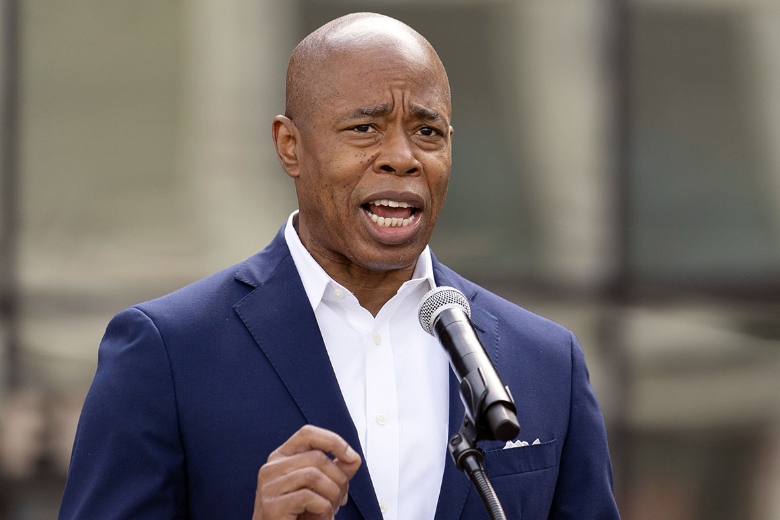During a fiery episode of The View, New York City Mayor Eric Adams took an unexpected stance, urging the show’s hosts to rethink their approach to criticizing President-elect Donald Trump and his new administration. Adams challenged the hosts’ dismissive rhetoric, sparking a rare on-air confrontation that highlighted the increasing divisions in American public discourse.
The exchange began after co-host Sunny Hostin criticized Trump’s recent nomination of Robert F. Kennedy Jr. as Secretary of Health and Human Services. Known for his controversial stance on public health, Kennedy’s appointment has sparked significant backlash. Hostin was quick to question Kennedy’s qualifications, launching into a sarcastic commentary on his fitness for the position. “RFK Jr. ate some pork, and now he has a brain worm,” Hostin remarked dismissively, questioning if he should be “in charge of our food.”
Her comment received laughter from some but was followed by a similarly critical remark from co-host Ana Navarro, who also cast doubt on Kennedy’s suitability. As the conversation seemed set to escalate, Adams intervened, calling on the hosts to reconsider the divisive tone in their remarks.
Adams addressed the persistent and heated opposition to Trump and his appointees, reminding the panelists of the impact their words can have on the public’s ability to engage in productive dialogue. “We’ve reached a point in this country where we no longer want to engage in conversation,” Adams noted. “Labeling Trump as a threat to democracy—going as far as comparing him to Hitler—is a step too far. It’s an insult to the millions who suffered during that time. We need to bring down the rhetoric and start engaging in conversation.”
The mayor’s response struck a chord, as it contrasted sharply with the prevailing narrative among many Democrats who have expressed extreme opposition to Trump’s policies and appointments. Adams referenced former President Barack Obama’s past calls for unity, emphasizing the importance of seeking common ground. “This is not the divided states. This is the United States,” he continued. “We’re the greatest country on the globe, and people are watching us.”
In an unusual twist, Adams appeared to side with the Trump administration’s prerogative to make executive appointments. He suggested that a newly elected president deserves the chance to select individuals who align with their vision, even if those choices are controversial. “Executives will nominate and bring in those who they believe will move their vision forward,” Adams argued. “That’s the role of an executive leader, and we need to give them the space to do it.”
Adams’ comments were well-received by some who saw his call for a measured tone as a necessary reminder in today’s polarized political climate. His stance, advocating for respectful dialogue rather than relentless attacks, reflects a perspective rarely seen in media coverage of Trump.
The conversation around Kennedy’s nomination for Health and Human Services has indeed been intense. A vocal critic of vaccines, Kennedy’s views have caused him to be a lightning rod for debate. For his supporters, his willingness to question public health norms is a refreshing challenge to bureaucratic conformity; for detractors, it raises concerns over his qualifications and potential influence on public health policy. The controversy surrounding his nomination is indicative of the broader clash over the direction of Trump’s incoming administration.
Trump, however, has defended his decision to appoint Kennedy, asserting that Kennedy’s iconoclastic stance aligns with his administration’s aim to push back against entrenched bureaucracies. Trump has publicly praised Kennedy’s willingness to confront the “status quo,” positioning him as an advocate for change.
JUST IN: NYC Mayor Eric Adams reacts to Trump selecting RFK Jr. for HHS Secretary… wow, listen to what he says – The View must be PISSED! He sounds like a Trump supporter.
“Executives will nominate and bring in those who they believe will move their vision forward.”
“Let’s be… pic.twitter.com/aQpjFfFuca
— Eric Daugherty (@EricLDaugh) November 15, 2024
While Adams’ defense of Trump’s appointments may have surprised The View’s panel and audience, it serves as a reminder that there are varied perspectives within the Democratic Party on how to respond to the incoming administration. His remarks also echo a broader, often-unvoiced frustration among some Democrats who worry that inflammatory language can undermine legitimate political critique, making it harder to engage constructively on important issues.
Adams’ call for moderation comes amid a backdrop of heightened tensions surrounding Trump’s re-election, as well as escalating disagreements over how best to address his policies. For Trump supporters, the choice of Kennedy as Health and Human Services Secretary is a strategic move to disrupt an agency seen as overly bureaucratic. For critics, Kennedy’s controversial views risk undermining public health efforts.
While reactions to Adams’ comments were mixed, they emphasize the need for a more balanced approach as the country prepares for Trump’s second term. Adams’ willingness to call out his own party’s rhetoric in a public forum was a stark reminder of the importance of constructive dialogue. Whether or not this approach gains traction among Democrats, Adams’ words stand as a call to keep political disagreements rooted in mutual respect.
As Adams reminded The View audience, unity does not require uniformity of thought. His message highlights a choice facing both parties: to continue down the path of divisive rhetoric or to pursue a future where disagreement does not preclude dialogue. Only time will tell if this appeal for moderation will resonate beyond The View’s audience and into the political discourse as a whole.



What the view doesn’t understand is they are the disgrace there the ones on the wrong side of achievement these assholes don’t under stand more than half of the American people want bid changes that’s why they voted for Trump. So finally shut the f-ck up. Your ratings suck because your the cesspool swamp of announcers and the American people are sick on tired of your lying and destroying America. Your accomplishing nothing but looking and sounding like assholes. The show should be canceled and everyone fired. That’s why they’re going bankrupt sh-t show with big negative people. Same crap for 12 years